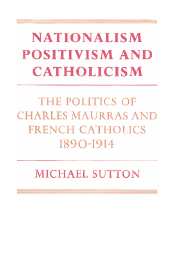 Nationalism, Positivism and Catholicism
Nationalism, Positivism and Catholicism Book contents
- Frontmatter
- Contents
- Dedication
- Acknowledgements
- Introduction
- 1 Maurras's appreciation of Comte
- 2 Individualism, the decline of France, and Maurras's proposed remedy
- 3 The time of the separation of Church and State
- 4 Blondel and Maurras
- 5 Laberthonnière's separation between politics and Christian faith
- 6 Orthodoxy and Rome
- Epilogue
- Notes
- Index
- Cambridge Studies in the History and Theory of Politics
Epilogue
Published online by Cambridge University Press: 22 September 2009
- Frontmatter
- Contents
- Dedication
- Acknowledgements
- Introduction
- 1 Maurras's appreciation of Comte
- 2 Individualism, the decline of France, and Maurras's proposed remedy
- 3 The time of the separation of Church and State
- 4 Blondel and Maurras
- 5 Laberthonnière's separation between politics and Christian faith
- 6 Orthodoxy and Rome
- Epilogue
- Notes
- Index
- Cambridge Studies in the History and Theory of Politics
Summary
It remains by way of epilogue to put what has been recounted in a broader perspective, first by reconsidering the nature and significance of Maurras's nationalism and his appreciation of Comtian Positivism, and secondly by reviewing various aspects of the major Catholic controversy that his Positivist brand of nationalism led to.
Maurras's main borrowing from Comte was the idea of a subjective synthesis, which is basically the idea that thought and action can be made properly coherent through their being ordered in the service of a collective ‘Great Being’ in which the subject incorporates himself through sentimental (or existential) choice. It is this idea that Comte had intended to develop at length in his unfinished work Synthèse subjective, and it is also the idea that underlies the Système de politique positive. That Maurras's appreciation of this fundamental Comtian idea has been ignored or misunderstood is in large part due to the fact that Comte's own philosophy, as represented by the Cours de philosophie positive and the Système de politique positive together, has also been widely ignored or misunderstood. This in turn is in large part the legacy of Littré's reduction of Comte's Positivism to a form of scientism. In the late nineteenth century, however, there was one masterly essay of interpretation quite outside this scientist mould, namely The Social Philosophy and Religion of Comte written by Edward Caird (the prominent Scottish neo-Hegelian who was to succeed Benjamin Jowett as Master of Balliol College, Oxford in 1893).
- Type
- Chapter
- Information
- Nationalism, Positivism and CatholicismThe Politics of Charles Maurras and French Catholics 1890–1914, pp. 241 - 262Publisher: Cambridge University PressPrint publication year: 1982
